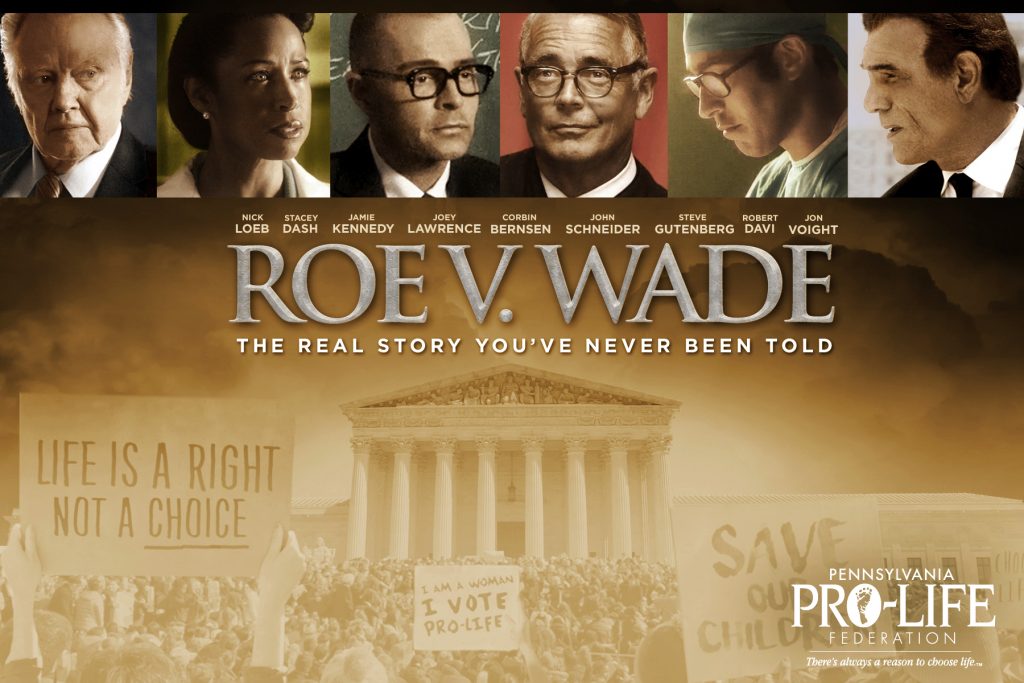
by Bonnie Finnerty, Education Director
Where were you in 1973?
Perhaps you remember it well. Perhaps you weren’t even born.
I was five years old, blissfully unaware of the volatile changes occurring in our culture.
It would be many years before I would know what Roe v. Wade was. By that time, an abortion narrative had been carefully crafted and a misleading lexicon taken hold, phrases like “pro-choice”, “reproductive rights”, and even “access to health care.”
Which is why the movie Roe v Wade is so fascinating and so very relevant. It offers a fast-paced, fact-checked depiction of events leading to the most controversial court case of our time, a historical moment that preceded many Americans alive today.
For those familiar with the history of abortion in this country, this movie smoothly ties together main players and events, helping the viewer to see the big picture. For others, the film will expose how the true story of Roe has been omitted from decades of abortion propaganda.
Told through the lens of Dr. Bernard Nathanson (played by co-producer Nick Loeb), the movie captures his evolving relationship with abortion: from paying for a girlfriend’s abortion to co-founding the National Association for the Repeal of Abortion Laws (NARAL) to becoming New York’s busiest abortionist. With over 70,000 deaths attributed to his practice, he became known as “The King of Abortion” and “The Scraper.” But as the film depicts, Nathanson experiences a heart-wrenching epiphany that leads him to abandon his lucrative work and become an outspoken pro-life activist.
As Nathanson narrates his journey, we meet his sidekick Lader, who has authored a book called Abortion. He recruits friend and feminist Betty Friedan to the abortion cause. Reluctant to make abortion the focus of the women’s rights movement, Friedan does ultimately bring the National Organization for Women (NOW) into the fight, but observes, “You boys are only in favor of abortion because it’s cheaper than child support.”
For Larry Lader allies are not enough. He believes every cause has to identify an enemy, and for the abortion movement, he shrewdly chooses the biggest defender of the unborn, the Catholic Church. A master media manipulator, Lader is able to vilify the Church while promoting his newly-coined term “pro-choice” and his “abortion-on-demand” agenda in major publications.
Today’s viewers may be shocked to see the dominant role that men, not women, actually played in legalizing abortion. In addition, to Nathanson and Lader, the Supreme Court at that time was all male, none of whom could have ever felt the flutter of life in their belly or witnessed an ultrasound image of that life. The movie reveals that two justices, Potter Stewart and Harry Blackmun, actually had family members who volunteered at Planned Parenthood while Roe was in the courts, yet they didn’t recuse themselves.
A little-known fact explained in the movie is that arguments for Roe were heard twice, once in 1971 and then again in 1973. Justice Warren Burger (played by John Voight) insisted on the second hearing since two seats on the Court had been vacant the first time around. With a case as controversial as Roe, he felt a decision should be made by a full court. Tragically, in the time between oral arguments, Burger and Blackmun would switch their votes to be in favor of Roe, likely a result of media and family pressure.
An outstanding woman in the film is the poised and brilliant Dr. Mildred Jefferson, the first black woman to graduate from Harvard Medical School. Recognizing that abortion violates the Hippocratic Oath she took, she decides she cannot sit on the sidelines. “Life begins at conception. As a physician, I know this.” She goes on to become President of the newly formed National Right to Life Committee, now the oldest and largest pro-life organization in our country.
Although dense with people, events, and information, the movie flows easily, thanks to Nathanson’s retrospective voice framing the story. The extensive, detailed research that underscores the film is impressive, making this an excellent educational tool not only for today but for generations to come.
Many scenes will give the viewer pause: the arrest of clergy involved in a secret abortion-referral network, Planned Parenthood fundraising at the Playboy Mansion, Nathanson’s overseas training in “assembly-line” abortion methods, the emotional recitation of the diary of the unborn, and the stirring closing argument offered by Robert Flowers.
Many of the lines are thought-provoking. Throughout the film, Constitutional law professor Robert M. Byrn offers bits of wisdom, quotations from historical figures like Benjamin Franklin and John Marshall.
But perhaps it is his own words to his students that should resonate with us long after viewing the movie, impelling us to never stop advocating for the innocent, vulnerable child in the womb.
“Don’t you think someone’s hopelessness should motivate us to protect them, not destroy them?”
(For $12.99 plus tax, you can stream Roe v Wade to any device by clicking here.)
.
